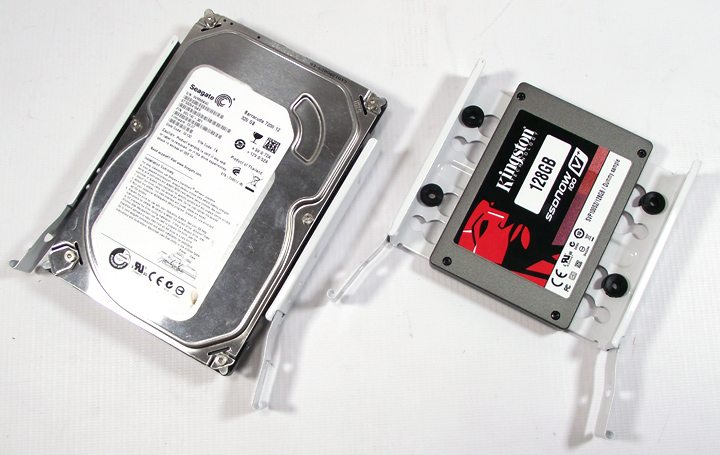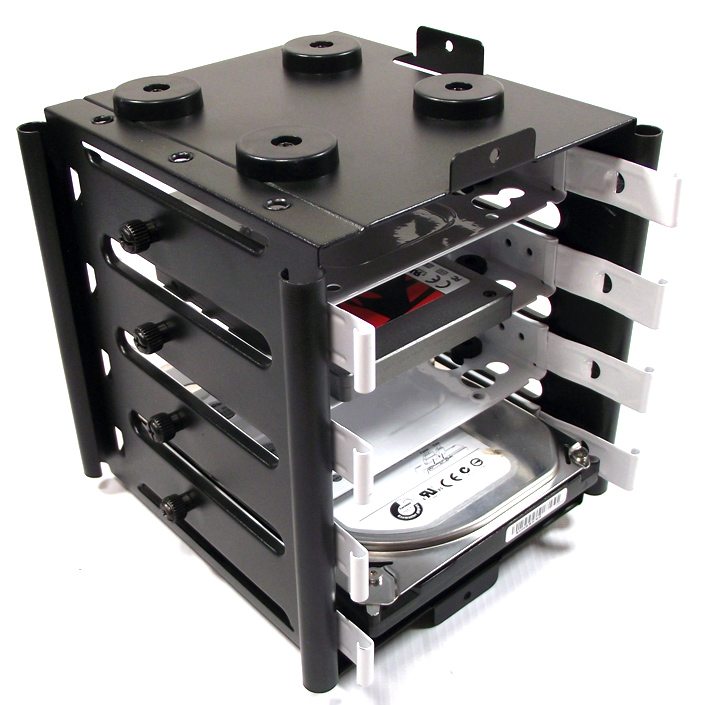Fractal Design Arc Midi Mid-Tower Chassis Review
Luke Hill / 13 years ago
Attaching 2.5″ or 3.5″ drives to the HDD/SSD trays is a fairly simple process, but not a tool-less one. Either drive is fastened from underneath via specific screws. The HDD installation method utilizes silicone dampers to reduce noise-causing vibrations.

Each HDD/SSD tray is secured to the 4-bay HDD cage via a thumb screw. Sliding the tray into the cage was very awkward since it didn’t seem to fit unless a decent amount of force was applied; a force which resulted in the cage becoming scratched. The cage features gaps to allow air to flow through it.

Installing our components into the Fractal Design Arc Midi was simple. The whole process was very quick and we didn’t suffer any major inconveniences. Excellent grommet positioning coupled with a decent amount of clearance behind the motherboard tray makes cable management a painless task. Clearance between the top of our motherboard and the roof mounted fans is 20mm meaning that 38mm thick exhaust fans could potentially fit in the roof mounts. Using the roof fan location nearest the 5.25″ bays shouldn’t render the uppermost bay inaccessible for an optical drive, but it will make routing the front panel cables an awkward job. Installing PCI expansion cards wasn’t as simple as it could have been. The PCI slots and their thumb screws don’t seem to want to work with each other unless you angle them perfectly.

Rear cable management is straightforward thanks to the intelligently positioned cable routing grommets. 21mm of clearance should suffice for most mid range systems, but enthusiasts using multiple power-requiring add-on cards or non-modular power supplies may struggle to re-attach the side panel after installation. Black front panel cables keep the chassis’ internal style intact but a black internal USB 3.0 cable would have been preferable to the blue one used.

Our ‘average’ sized 700W PSU was able to fit in the Arc Midi without causing clearance issues for the bottom 120/140mm fan mount. A small gap above the power supply is extremely convenient when routing front panel cables or, in this case, the fan control knob’s cables.

Rotating the upper HDD cage by 90° allows airflow to be directed to the graphics card and motherboard area. This orientation is a worthwhile addition, but wouldn’t be my preferred orientation due to the additional time required when removing or installing a new storage drive.

A black optical drive allows the sleek appearance to continue with the system components installed. It is a good job that most people very rarely install 5.25″ drives because the tool-less process which utilizes 4 thumb screws wasn’t easy due to awkwardly fitting thumb screws.

A PCI mounted fan control knob is an important addition which is simple, yet highly effective. At low settings, the fan controller can shut off 2 fans, turning them on one-by-one as the voltage is increased. This is a useful feature, but the noise reduction properties are rendered useless due to the high-pitched squeal which originates from the fan controller when the lower settings are applied.




















